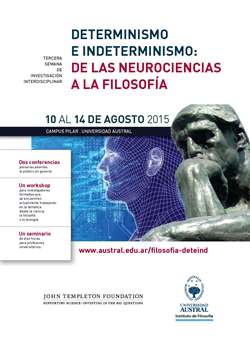Determinism and Indeterminism
From neuroscience to philosophy
(10-14 Agosto 2015 – Universidad Austral)
Throughout the Weeks the following activities will be organized:
- Two plenary lectures open to the general public: 1) “The mind-brain problem and the idea of man”, Dr. Carlos Blanco, Universidad Pontificia Comillas, España. 2) “Does the word ‘consciousness’ still make psychologists laugh?”, Dr. José Ahumada, Universidad Nacional del Córdoba, Argentina.
- A ten-hour course for academics: “Mental health and freedom”, Dr. Juan José Sanguineti, Università della Santa Croce, Italia.
- A workshop for researchers who are working at present on this issue, in science, philosophy or theology.
Workshop
First day: Philosophy of science. Philosophy asks Neurosciences
1. How do the different epistemological levels of cognitive sciences, psychology and the neurosciences relate to each other? Do neurobiological descriptions and explanations offer a determinist or an indeterminist picture?
Bibliography:
R. N. McCAULEY, “Reduction: Models of cross-scientific relations and their implications for the psychology-neuroscience interface”, in P. THAGARD, Handbook of the Philosophy of Science. Philosophy of Psychology and Cognitive Science, North-Holland: Elsevier, 2007, pp. 105-158.
W. GLANNON, “Our Brains Are not Us”, in Brain, Body, and Mind. Neuroethics with a Human Face, Oxford: Oxford University Press, 2011, pp. 11-39.
2. Is an epistemological or a semantic dualism between the mental and the neural viable without some kind of ontological duality, such as that of mind and body?
Bibliography:
P. RICOEUR & J.-P. CHANGEUX, Lo que nos hace pensar, Barcelona: Península, 1999, pp. 9-75; 171-180.
D. ROBINSON, “Still Looking: Science and Philosophy in Pursuit of Prince Reason”, in M. BENNETT, P. HACKER, D. DENNETT & J. SEARLE, Neuroscience and Philosophy. Brain, Mind and Language, New York: Columbia University Press, 2007, pp. 171-193.
Second day: Philosophy of the Neurosciences. Neurosciences ask Philosophy
3. Can the framework of a complex nature be a condition for a non-reductionist mental causation open to human free choices? In this sense, could the notion of downward causation as selection from stochastic processes of a lower level be helpful?
Bibliography:
J. KIM, “Causation and mental causation”, in P. McLAUGHLIN & J. COHEN, Contemporary Debates in Philosophy of Mind, Oxford: Blackwell, 2007, pp. 227-242.
N. MURPHY, “Avoiding neurobiological reductionism: the role of downward causation in complex systems”, in J. J. SANGUINETI, A. ACERBI & J. A. LOMBO (eds.), Moral Behavior and Free Will. A Neurobiological and Philosophical Approach. Vatican City: IF Press, 2011, pp. 200-222.
4.Are random neurobiological processes compatible with the setting of goals, especially by a voluntary agent? Is it possible to talk about finality and free will within an indeterminist framework?
Bibliography:
B. LIBET, “Do we have free will?”, in R. Kane (ed.), Oxford Handbook of Free Will, Oxford: Oxford UP, 2005, pp. 552-564.
M. BALAGUER, “Why the compatibilism issue and conceptual-analysis issue are metaphysically irrelevant?”, in Free will as an Open Scientific Problem, Cambridge-MA: MIT Press, 2010, pp. 25-54.
J. J. SANGUINETI, “Can free decisions be both intentional and neural operations?”, in J. J. SANGUINETI, A. ACERBI & J. A. LOMBO (eds.), Moral Behavior and Free Will. A Neurobiological and Philosophical Approach, Vatican City: IF Press, 2011, pp. 149-168.
Third day: Neurosciences & Religion. Neurosciences ask Religion
5. Is the human mind an emergent property of super-complex neural systems? Is it possible to speak about a human soul in a neurobiological account?
Bibliography:
P. CLAYTON, “Neuroscience, the person and God: An emergentist account”, in R. J. RUSSELL, N. MURPHY, T. C. MEYERING & M. a. ARBIB (eds.), Neuroscience and the Persons: Scientific Perspectives on Divine Action, Berkeley: Vatican Observatory Foundation, 2002, pp. 181-214.
V. G. STARRATT & T. K, SHACKELFORD, “The basics components of the human mind were solidified during the Pleistocene epoch”, in F. J. AYALA & R. ARP, Contemporary Debates in Philosophy of Biology, Oxford: Wiley-Blackwell, 2010, pp. 231-242.
6.Is it possible to distinguish between free will and freedom? Is the concept of personal freedom compatible with neuroscientific inquiry or does it require a different kind of approach?
Bibliography:
J. A. GARCÍA GONZÁLEZ, “Autognosis y conocimiento de Dios: el acceso a Dios desde la persona humana”, Studia Poliana(2012) 14, pp. 55-82.
R. SCRUTON, The Face of God. The Gifford Lectures 2010, London-New York: Continuum, 2010, pp. 21-49.
More information here.


